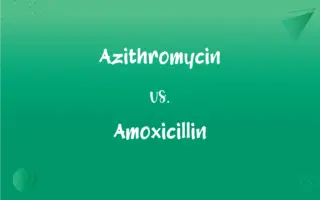Biodegradation vs. Bioremediation: What's the Difference?
Edited by Aimie Carlson || By Harlon Moss || Published on February 27, 2024
Biodegradation is the natural breakdown of materials by microorganisms, while bioremediation is the use of organisms to detoxify polluted environments.

Key Differences
Biodegradation involves the natural decomposition of substances by bacteria, fungi, or other organisms, breaking down complex compounds into simpler ones. Bioremediation, however, specifically utilizes these biological processes to clean up contaminated environments, like oil spills.
The process of biodegradation is a natural part of ecosystems, contributing to nutrient cycling and waste decomposition. In contrast, bioremediation is a deliberate intervention, employing microorganisms to remove pollutants from soil, water, or air.
Biodegradation can occur under various environmental conditions, affecting the breakdown of organic matter and synthetic materials. Bioremediation techniques, on the other hand, are often tailored to specific pollutants and environments, optimizing the cleanup process.
The efficiency of biodegradation depends on factors like temperature, oxygen availability, and the nature of the material. Bioremediation strategies may involve enhancing these environmental conditions to accelerate the degradation of contaminants.
Biodegradation is a key component in waste management and recycling processes, reducing the environmental impact of waste. Bioremediation represents a sustainable approach to environmental restoration, aiming to return contaminated sites to their natural state.
ADVERTISEMENT
Comparison Chart
Definition
Natural breakdown of materials by organisms
Use of organisms to detoxify polluted environments
Purpose
Part of natural nutrient cycling and waste decomposition
Deliberate environmental cleanup of pollutants
Process
Occurs under various environmental conditions
Often tailored to specific contaminants
Factors Influencing Efficiency
Temperature, oxygen, material nature
Environmental conditions, pollutant type
Environmental Role
Waste management and recycling
Environmental restoration and detoxification
ADVERTISEMENT
Biodegradation and Bioremediation Definitions
Biodegradation
It can occur in various environments, including soil, water, and air.
The biodegradation of oil in ocean water is facilitated by specific marine bacteria.
Bioremediation
Bioremediation is the use of living organisms to clean up contaminated environments.
Bioremediation techniques are used to treat oil spills in oceans.
Biodegradation
It involves breaking down complex compounds into simpler, harmless ones.
Plastic biodegradation reduces pollution by converting it to biomass and water.
Bioremediation
It can be used for various pollutants, including heavy metals and hydrocarbons.
Bioremediation processes are employed to reduce heavy metal contamination in water bodies.
Biodegradation
Biodegradation is a critical process in nutrient cycling and ecosystem balance.
Leaf litter undergoes biodegradation, contributing to forest soil fertility.
Bioremediation
It involves harnessing natural biological processes to detoxify pollutants.
Bacteria are used in bioremediation to degrade toxic chemicals in soil.
Biodegradation
Biodegradation is the natural decomposition of substances by microorganisms.
The biodegradation of food waste enriches soil with nutrients.
Bioremediation
Bioremediation aims to restore polluted sites to their natural, non-toxic state.
Bioremediation is applied to decontaminate industrial waste sites.
Biodegradation
Biodegradation helps in waste management by naturally recycling organic matter.
Composting relies on biodegradation to turn kitchen scraps into compost.
Bioremediation
Bioremediation represents an environmentally friendly approach to pollution cleanup.
Phytoremediation, a form of bioremediation, uses plants to absorb pollutants from the soil.
Biodegradation
Capable of being decomposed by biological agents, especially bacteria
A biodegradable detergent.
Bioremediation
The use of biological agents, such as bacteria or plants, to remove or neutralize contaminants, as in polluted soil or water.
Biodegradation
The decomposition of any material by microorganisms.
Bioremediation
(biochemistry) The use of biological organisms, usually microorganisms, to remove contaminants, especially from polluted water
Bioremediation
The branch of biotechnology that uses biological processes to overcome environmental problems.
Bioremediation
The branch of biotechnology that uses biological process to overcome environmental problems
Bioremediation
The act of treating waste or pollutants by the use of microorganisms (as bacteria) that can break down the undesirable substances
FAQs
What is biodegradation?
Biodegradation is the breakdown of materials by microorganisms into simpler substances.
What is the main goal of bioremediation?
The main goal of bioremediation is to detoxify and restore polluted environments.
What defines bioremediation?
Bioremediation is the process of using organisms to remove pollutants from the environment.
How does biodegradation contribute to the environment?
Biodegradation plays a key role in nutrient cycling and reducing waste in ecosystems.
Are all materials susceptible to biodegradation?
Not all materials are easily biodegradable; it depends on their composition and environmental conditions.
Is biodegradation a slow process?
The speed of biodegradation varies, but it can be a slower process compared to chemical degradation.
How does bioremediation impact biodiversity?
Bioremediation can enhance biodiversity by restoring polluted habitats to healthier states.
What are some common methods of bioremediation?
Common methods include bioaugmentation, biostimulation, and phytoremediation.
Can bioremediation be used for all types of pollution?
Bioremediation is effective for many pollutants, but its suitability varies depending on the type and extent of contamination.
What role do plants play in bioremediation?
Plants can absorb, concentrate, and break down pollutants, making them useful in bioremediation.
What are the economic benefits of bioremediation?
Bioremediation offers cost-effective and sustainable solutions for environmental cleanup.
What factors affect the rate of biodegradation?
The rate of biodegradation is influenced by temperature, oxygen levels, and the nature of the material.
Can biodegradation occur in anaerobic conditions?
Yes, biodegradation can occur in both aerobic and anaerobic conditions.
How is bioremediation implemented?
Bioremediation is implemented by introducing or enhancing microbial populations in contaminated areas.
Is biodegradation always beneficial?
While generally beneficial, biodegradation can sometimes lead to the production of harmful byproducts.
Can bioremediation be used in marine environments?
Yes, bioremediation is effective in marine environments, especially for oil spill cleanups.
How does biodegradation affect landfills?
Biodegradation in landfills leads to the breakdown of organic waste, reducing landfill mass.
Is bioremediation always successful?
The success of bioremediation depends on various factors, including the type of pollutant and environmental conditions.
What are the limitations of biodegradation?
Limitations include the inability to degrade certain synthetic materials and varying efficiency based on environmental conditions.
Can biodegradation lead to complete mineralization?
Biodegradation can lead to complete mineralization, turning organic compounds into inorganic substances.
About Author
Written by
Harlon MossHarlon is a seasoned quality moderator and accomplished content writer for Difference Wiki. An alumnus of the prestigious University of California, he earned his degree in Computer Science. Leveraging his academic background, Harlon brings a meticulous and informed perspective to his work, ensuring content accuracy and excellence.
Edited by
Aimie CarlsonAimie Carlson, holding a master's degree in English literature, is a fervent English language enthusiast. She lends her writing talents to Difference Wiki, a prominent website that specializes in comparisons, offering readers insightful analyses that both captivate and inform.
































































